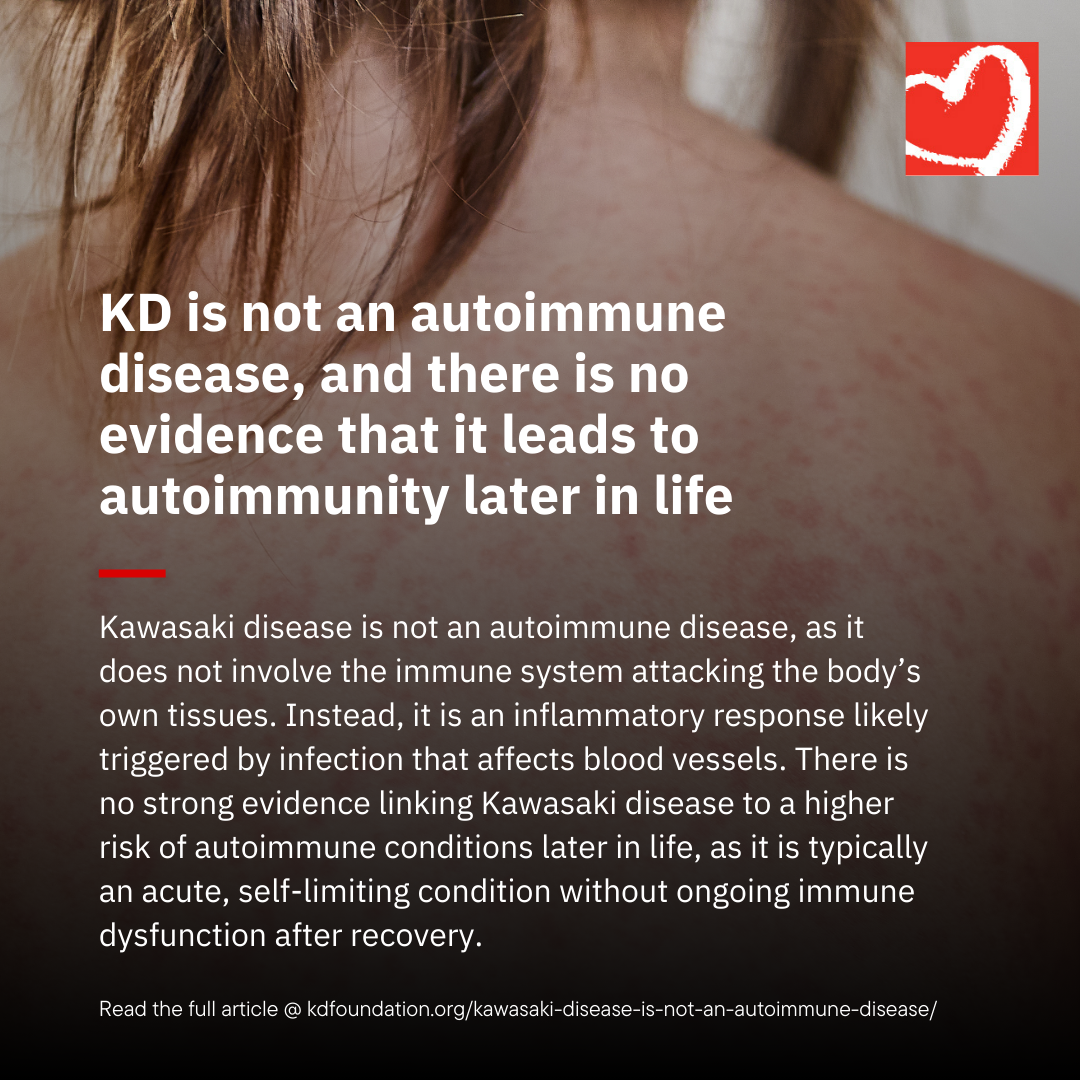
KD is not an autoimmune disease, and there is no evidence that it leads to autoimmunity later in life
Kawasaki disease (KD) is not classified as an autoimmune disease, and there is no substantial evidence indicating that patients who have had KD are predisposed to autoimmunity later in life. Here’s an explanation that clarifies both points based on the current understanding of KD:
1. Kawasaki Disease is Not an Autoimmune Disease:
Kawasaki disease is primarily an inflammatory disorder that affects the blood vessels, particularly in children. While the immune system is involved in its pathogenesis, KD does not meet the criteria for autoimmune diseases, which typically involve the immune system attacking the body’s own cells and tissues.
- Autoimmune diseases (like lupus or rheumatoid arthritis) occur when the immune system mistakenly produces autoantibodies—proteins that attack healthy tissues in the body. For example, in lupus, the immune system targets tissues like the kidneys, skin, and joints.
- In Kawasaki disease, the immune system’s inflammatory response is thought to be triggered by an infection or environmental factor, especially in genetically predisposed children. The inflammation causes damage to the blood vessels (vasculitis), but it does not involve the production of autoantibodies that attack the body’s own tissues. KD is more of an overreaction of the immune system to an external trigger rather than an autoimmune attack against the body itself.
Sources:
- According to the National Institutes of Health (NIH), KD is considered a systemic inflammatory disease, and although it involves immune activation, it does not meet the diagnostic criteria for autoimmune diseases (NIH, 2021).
- The Kawasaki Disease Foundation emphasizes that KD is not an autoimmune disorder, as it does not involve autoantibodies or sustained attacks on the body’s tissues. Instead, the condition is thought to be a response to a bacterial or viral infection (KDF, 2021).
2. No Evidence of Autoimmunity Risk Later in Life:
As of now, there is no evidence suggesting that children with Kawasaki disease are at an increased risk of developing autoimmune diseases later in life. While KD does involve immune system activation, this activation is acute and resolves with treatment, typically intravenous immunoglobulin (IVIG), which helps reduce inflammation.
- Autoimmune diseases involve long-term, chronic immune dysregulation, leading to sustained inflammation and damage to organs. In contrast, KD is generally self-limiting, meaning it resolves over time with appropriate treatment and does not involve long-term immune system dysfunction.
- Current research has not provided strong evidence that KD predisposes patients to later autoimmunity. A 2021 study published in Frontiers in Pediatrics found no evidence suggesting that KD is associated with an increased risk of autoimmune conditions or other inflammatory diseases later in life (Frontiers, 2021).
- A review in the Journal of Pediatrics (2020) also concluded that while KD patients need long-term monitoring for cardiovascular complications (such as coronary artery aneurysms), there is no clear evidence showing a link between KD and the development of autoimmune diseases later in life (AAP, 2020).
Sources:
- Journal of Pediatrics (2020) found no indication of autoimmunity in KD patients after their initial recovery from the disease (AAP, 2020).
- Frontiers in Pediatrics (2021) indicated that while research on KD continues, there is currently no evidence connecting KD to autoimmune diseases later in life (Frontiers, 2021).
Conclusion:
Kawasaki disease is not an autoimmune disease because it does not involve the immune system attacking the body’s own tissues through the production of autoantibodies, which is a hallmark of autoimmune disorders. Rather, KD is an inflammatory response likely triggered by infection, affecting the blood vessels. Additionally, there is no solid evidence linking Kawasaki disease to an increased risk of developing autoimmune conditions later in life, as KD is generally an acute, self-limiting condition with no ongoing immune dysfunction post-recovery.
Sources:
- National Institutes of Health (NIH) on Kawasaki Disease. NIH
- Kawasaki Disease Foundation. Kawasaki Disease Foundation
- The Journal of Pediatrics (2020). AAP
- Frontiers in Pediatrics (2021). Frontiers
